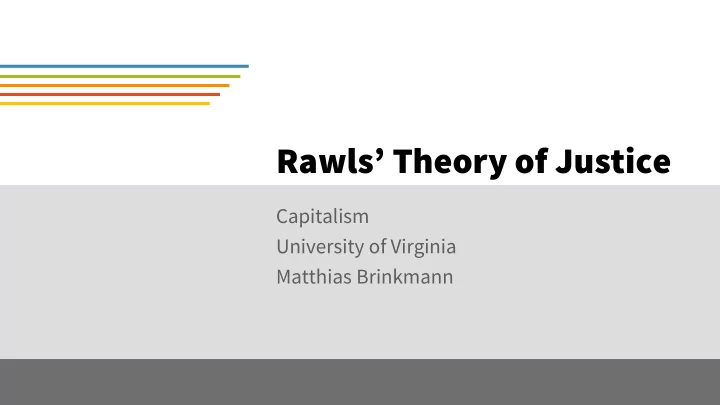

Rawls’ Theory of Justice Capitalism University of Virginia Matthias Brinkmann
Contents 1. The Original Position 2. Rawls’ Principles of Justice 3. Alternative Principles of Justice 4. Criticism & Discussion Rawls's Theory of Justice 2 17/10/2019
Social Contract Theory • Actual Social Contract Theory : a social contract is made which binds everyone Problems: Inequalities in power, bias, irrationality, infeasibility ❑ Social contract will be product of concrete social & historical situation ❑ • Hypothetical Social Contract Theory (Rawls): a hypothetical social contract is made between fully rational individuals who do not know their position in society Veil of ignorance solves bias and inequalities in power ❑ Stipulation of fully rational people solves problems of irrationality ❑ Rawls's Theory of Justice 3 17/10/2019
Argumentative Structure of Theory of Justice • Two steps: (i) philosophical assumptions determine the nature of the original position, (ii) the original position determines the principles of justice • We must reach “reflective equilibrium” between start and end points Reflective Equilibrium Philosophical Assumptions Original Principles (Veil of choice by determine Ignorance, Position hypothetical people of Justice Rationality, No Envy, etc.) Rawls's Theory of Justice 4 17/10/2019
Questions • What assumptions does Rawls make about the nature of the Original Position? (in particular, look at the list on p. 126-7) • Why does he make these assumptions? • How are the outcomes of the Original Position likely to change under different assumptions? Rawls's Theory of Justice 5 17/10/2019
Hypothetical Contracts • Dworkin’s Critique . “ a hypothetical contract is not a pale form of an actual contract; it is no contract at all ” Actual contracts are binding ❑ But hypothetical contracts are not! ❑ • Reply . The Original Position is not meant to describe a binding contract; it is an epistemic method of finding the true principles of justice Rawls's Theory of Justice 6 17/10/2019
Contents 1. The Original Position 2. Rawls’ Principles of Justice 3. Alternative Principles of Justice 4. Criticism & Discussion Rawls's Theory of Justice 7 17/10/2019
2½ Principles of Justice • Lexical Priority. Principle 1 must be fulfilled before 2(a); and 2(a) before 2(b) (I re-ordered the principles.) • Which liberties? Political liberty, speech and assembly, conscience, freedom of the person, rule of law, right to “hold personal property” (53) • What is distributed? Primary goods: all-purpose means everyone will want (rights, liberties, income and wealth, the social bases of self-respect) (54) Rawls's Theory of Justice 8 17/10/2019
Contents 1. The Original Position 2. Rawls’ Principles of Justice 3. Alternative Principles of Justice 4. Criticism & Discussion Rawls's Theory of Justice 9 17/10/2019
Principles of Distribution • Maximisation . Maximise the sum of benefits in society. • Maximin. Maximise the benefits given to the worst-off members of society. • Priority. Maximise the benefits in society, putting more weight on benefits given to the worse-off. • Sufficiency. Assure everyone a certain threshold of benefits. • Equality. Provide everyone with the same level of benefits, as far as possible. • Non-Intervention. Do not intervene in the distribution of benefits. • One-Off Transfer. Give everyone a considerable one-off payment at some point in their life (e.g., when they reach adulthood). • Upper Limits. Allow nobody to have benefits above a certain threshold. Rawls's Theory of Justice 10 17/10/2019
Mathematical Examples Consider the distribution D = 𝑒 1 , 𝑒 2 , 𝑒 3 , … , 𝑒 𝑜 . Let V(D) be the value of D. • Maximisation . 𝑊 𝐸 = σ 𝑗 𝑒 𝑗 • Maximin. V D = min 𝑒 𝑗 i 𝛽 where 0 < 𝛽 < 1 • Priority. 𝑊 𝐸 = σ 𝑗 𝑒 𝑗 , or 𝑊 𝐸 = σ 𝑗 𝑒 𝑗 • Sufficiency. Let 𝑡 𝑗 = 1 if 𝑒 𝑗 ≥ 𝑁 (where M represents some fixed, positive threshold) and 𝑡 𝑗 = 0 otherwise. Then 𝑊 𝐸 = σ 𝑗 𝑡 𝑗 1 • Equality. Let ҧ 𝑜 σ 𝑗 𝑒 𝑗 . Then 𝑊 𝐸 = σ 𝑗 (𝑒 𝑗 − ҧ 𝑒 = 𝑒)² 1 𝑗 = 1 if 𝑒 𝑗 ≥ 𝛾 ҧ • Relative Sufficiency. Let ҧ 𝑜 σ 𝑗 𝑒 𝑗 . Let 𝑠 𝑒 , where 0 < 𝛾 < 1 , 𝑒 = and 𝑠 𝑗 = 0 otherwise. Then 𝑊 𝐸 = σ 𝑗 𝑠 𝑗 Rawls's Theory of Justice 11 17/10/2019
What should be distributed? • Option 1: resources Income, wealth, land ❑ Problems: differential abilities to use and profit from resources, differential needs ❑ • Option 2: welfare Happiness, desire-satisfaction, subjective achievement ❑ Problems: difficulties in measuring welfare, deserved and undeserved differences ❑ • Option 3: opportunities for welfare Equalising all unchosen differences, but allowing for differences due to choice ❑ Problems: difficulties in bringing equality in this sense about, discerning chosen from ❑ unchosen Rawls's Theory of Justice 12 17/10/2019
Contents 1. The Original Position 2. Rawls’ Principles of Justice 3. Alternative Principles of Justice 4. Criticism & Discussion Rawls's Theory of Justice 13 17/10/2019
Questions 1. Why did the principles of justice you chose in the class experiment differ from those of Rawls? 2. What would speak in favour of choosing Rawls’s principles? Why would the contractors choose the Difference Principle (see p. 132ff.)? 3. What are the institutional implications of Rawls’s principles? Rawls's Theory of Justice 14 17/10/2019
Where do we go from here? Choices 1. Lomasky on a libertarian interpretation of Rawls 2. Rawls on the institutional implications of his principles (“property -owning democracy”) 3. Nozick’s libertarian critique of Rawls 4. Cohen’s socialist critique of Rawls 5. ... Rawls's Theory of Justice 15 17/10/2019
❖ Rawls famously suggested the thought Summary experiment of the Original Position in The Theory of Justice ❖ Crucial assumptions: the veil of ignorance, rationality and mutual disinterestedness of the parties, irreversibility of choice ❖ On the distributional side, Rawls favours the difference principle: inequalities are only acceptable if they favour the least well-off 16 17/10/2019
Recommend
More recommend